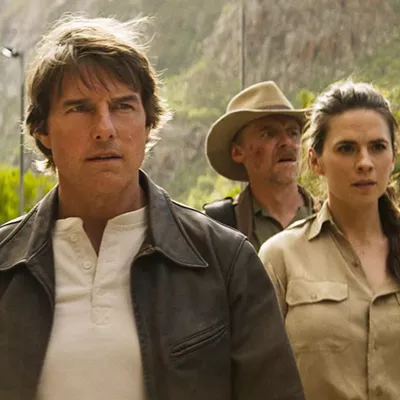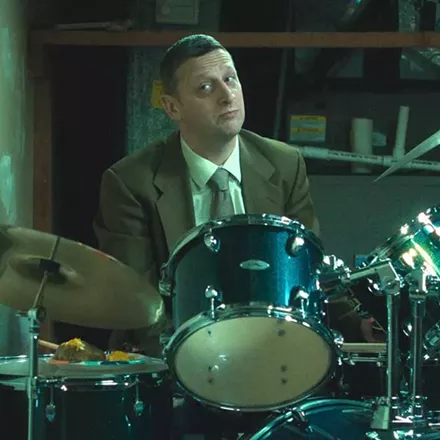It would be big-enough news to note that Martin Scorsese has made an accessible movie, one that can be fully enjoyed by more than just Scorsese buffs. Over the past decade, people didn't exactly go running to see Kundun or Bringing Out the Dead or even Gangs of New York. This time, though, he's tried something new -- or rather, he's tried something old-fashioned. The Aviator, which looks at about 20 years in the life of billionaire Howard Hughes -- focusing mostly on his careers in filmmaking and aviation, and his pursuit of glamorous women -- is an epic biopic about a man whose name is familiar to all and whose story is fascinating.
Yes, that would be big enough news. But along with Scorsese's triumph comes a similarly old-fashioned helping of acting from Leonardo DiCaprio that will cement him in the A-List of leading men. It's not as if DiCaprio hasn't been close before. He did star, after all, in the biggest moneymaker of all time, Titanic. And he played some fine comedy in Catch Me if You Can. But does anyone remember he was in The Quick and the Dead? Does anyone even remember The Beach?
Well, everyone's going to remember what he does in The Aviator. In a gigantic movie star turn, he doesn't miss a beat and he never overdoes his larger-than-life character.
Hughes is first seen as a young boy, as his overly protective mother instills a fear of disease in him, a lesson that will practically guide his germ-phobic life. The film immediately shoots up to 1927 when Hughes, already incredibly wealthy from his inheritance of the Hughes Tool Company, is on the set of the first of the two films he directed -- the WWI flying epic, Hell's Angels (the other was the Jane Russell "sex" western The Outlaw). Although he eventually produced a number of successful films, including Scarface and Flying Leathernecks, at this point, he had no idea what he was doing. DiCaprio plays him as a man who is in over his head, but who's determined to see things through with a perfectionist's control -- and at any cost.
Scorsese and writer John Logan (The Last Samurai, Gladiator) show him behaving like this no matter what challenges he faced in his life, whether he was brazenly approaching a new woman he's marked for conquest or attempting to become the fastest man on the planet by designing the world's fastest airplane and then flying it.
DiCaprio carries that portrayal to its believable limits. You can practically see his character's mind at work, constantly spinning new webs of ideas, though not bothering to think them through. When he doesn't like the look of an empty sky while shooting Hell's Angels, he hires a personal meteorologist (Ian Holm) and issues a demand: "Find me some clouds." If a certain well-known aviation company is doing something that might hinder him, he tells the man in charge of his money (John C. Reilly), "Buy it."
That's exactly where the second half of the film goes. Hughes decides that, after conquering Hollywood, he would revolutionize the aviation industry, both commercially and in the name of the war effort. Some of this led to disaster, some to embarrassment, and some -- as shown in an entertaining battle of wits in a courtroom with Sen. Ralph Brewster (Alan Alda, in fine form) -- to changes in certain laws.
It's a short matter of time before Hughes loses interest in the Hughes Tool Company and starts up the Hughes Aircraft Company. His design of the FX-11 reconnaissance plane leads to the film's most dazzling set piece. His design of the gigantic Hercules, also known, to his dismay, as the Spruce Goose, leads to initial ridicule.
Scorsese has assembled an all-star cast, members of which line up for cameo after cameo. Jude Law, Alec Baldwin, Willem Dafoe and Kate Beckinsale all pass through. Cate Blanchett gets a juicy part as Katharine Hepburn, one of Hughes' great loves, and she overplays it deliciously, using that peculiar accent to spout off phrases such as "Hot dog!" and "Golly!" Scorsese also concentrates on the look of the film: He makes many of his shots completely symmetrical, and he regularly has people running or planes flying right into his camera.
The film doesn't go into Hughes' later years, when his eccentricities turned into derangement. But there are hints along the way, and there is a sequence about the period when he locked himself in a room, let his hair and fingernails grow to ridiculous lengths, and started collecting his own urine in bottles. The Aviator is a long film, and a few scenes seem a little pointless as they're happening. But every one of them eventually aids in painting a colorful portrait of this very complicated character.

















